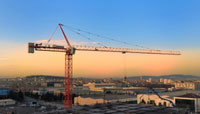The construction sector in South Africa continues to face the dual effect of a slowdown in available infrastructure projects and the impact of rising costs. With Standard and Poor's (S&P) downgrade on South Africa's sovereign credit rating, the outlook has deteriorated further, potentially impacting on governments 2020 infrastructure roll-out plan.
This is according to Eyal Shevel, head of Corporate Ratings at Global Credit Ratings (GCR), who says many companies operating in South Africa's construction sector are facing declines in their order books whilst at the same time experiencing tighter margins.
He says the slowdown is largely due to the lack of new projects coming on stream, which is having a more significant impact on the large construction firms. "Many companies have sufficient secured contracts to maintain revenue at current levels through 2013. However, little in the way of new projects has been evidenced and as a result the medium term order books are looking a bit thin."
Funding of infrastructure projects
Though government has said that over one trillion Rand is going to be invested in infrastructure projects over the next eight years, there is no certainty on the financial feasibility of these initiatives. He says any further downgrades following S&P's recent movement would raise the cost of borrowing for both South Africa and state-owned entities. "South Africa already spends about 3% of GDP on interest payments, so any increase in interest payments could seriously affect the infrastructure investments already announced by the government."
Shevel notes that there are three ways to fund infrastructure projects in South Africa. "These are funding provided by the state from tax revenues, private/public partnerships (PPPs), and the user pays principle. Currently, none of these available sources of funding appear to be looking healthy. The state is increasingly running into funding constraints due to lower tax revenues, greater social spend and the likely increased cost of debt funding if the rating outlook remains negative.
"Regarding PPPs, most construction companies are wary to commit resources, given the government's uncertain stance towards such projects. Companies had invested up to R20 million in bids that never progressed anywhere or were cancelled without explanation; and finally the e-tolling debacle has evidenced the significant public opposition to the user pays principal."
High volume in Africa
By contrast there appear to be a high volume of construction prospects in other African countries, which also offer wider margins if managed carefully. "As a result, local companies are looking to grow their order books outside of South Africa's borders, in particular in regions with large mining projects such as Mali, Zambia and East Africa. Other companies are looking further afield to regions such as Australasia and Asia," he explains.
"However", cautioned Shevel, "some companies are again looking outside of the private sector in Africa, to government and development projects. These carry significantly more risk in terms of dealing with bureaucracy and securing payment. Most local construction firms have burned their finger badly on such projects in the past. As a result risk management procedures need to be robust, or losses can quickly escalate."
Impact on employment is detrimental
He says this move is expected to have a detrimental impact on employment opportunities for entry level workers in the infrastructure sector in South Africa. "While skilled engineers and project management specialists can almost as easily apply their knowledge to projects in Mali as to the Drakensberg, it is the average construction workers who will lose their jobs as local projects dry up. Unemployment as a result of insufficient funding and lack of work being offered to local builders is a very unfortunate reality that many will face".
He says growth in projects in the mining sector has so far managed to hold up construction in South Africa over the past two years but with this too is now in jeopardy given the current labour unrest in the sector.



























